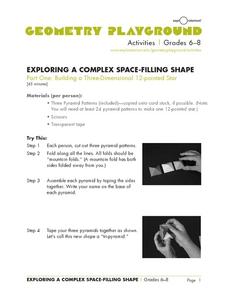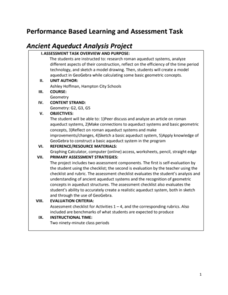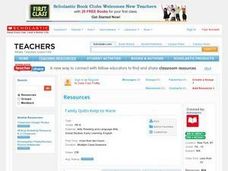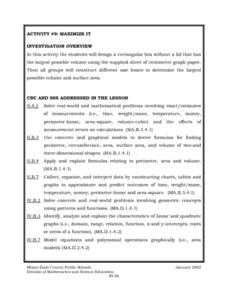Exploratorium
Exploring a Complex Space-Filling Shape
Middle schoolers build a three-dimensional 12-pointed star as a geometric exercise. The shape is quite-difficult to construct. Luckily there is an excellent template that learners cut out, then use to make their pyramid. The second part...
Radford University
Ancient Aqueduct Analysis Project
Let the class' knowledge of geometry flow like water in an aqueduct. Future mathematicians research ancient Roman aqueducts and consider the geometric concepts necessary in their construction. They then use GeoGebra to create models of...
Virginia Department of Education
Exploring 3-D Geometry
Take young mathematicians on an exploration of the world of 3-D geometry with this seven-lesson unit. After first defining the terms perimeter, area, and volume and how they apply to the real world, students continue on...
Curated OER
Tessellations: Geometry and Symmetry
Young scholars explore the concept of tessellations. In this tessellations lesson, students use an applet to construct tessellations. Young scholars use regular polygons to construct tessellations. Students find patterns and symmetry in...
Curated OER
Pop-it...Stop-it
Students observe how certain geometric shapes can be used to make some structures rigid and others flexible. The activity involves construction of a 30-60 right triangle, folding while following directions, and identifying polygons.
Curated OER
Spacemobiles
Aspiring astronauts construct a space vehicle using cylinders, cones, spheres, and rectangular prisms. This is an engaging method of learning about three-dimensional shapes. Note that the word cylinder is constantly misspelled in the...
Alabama Learning Exchange
Polygon Perimeters
What are polygons? Learners find the perimeter of various geometric figures that the teacher has drawn in chalk on the sidewalk. A worksheet to record their measurements is provided. Get your third graders outside and exploring the world...
Curated OER
Net "Working"
Upper elementary and middle schoolers explore the properties of various polygons. They use video, resource links, and engage in hands-on activities in order to construct geometric nets. This fine plan should lead to increased...
PBS
Surface Area and Volume
You and your class will like this lesson on using visual models to relate the volume and surface area of solid shapes. Learners construct three-dimensional forms using nets. They calculate the surface area and volume for each and then...
Curated OER
ExplorA-Pond:3rd Grade Shapes & Fractions
Students, using a map, drawing or aerial view of a pond, represent the shape of the pond using simple geometric shapes or fractions of those shapes. They identify the numerator and denominator in each fraction created.
Curated OER
Learning by Logic - Total Surface Area
Geometers calculate the area of plane surfaces using the formulas for the area of a square, rectangle, and triangle. They develop the formula for calculating the total surface area of two geometric solids: the cube and rectangular prism.
Curated OER
The Right Stuff
Studentsare introduced to the Pythagorean Theorem by exploring right triangles and the squares built on each side. They apply the Pythagorean Theorem to real-world problems. Students u se informal and nonformal arguments of proof (i.e.,...
Curated OER
Shapes and Patterns in Art and Oceans
First graders draw, cut out, and design their own fish shapes by cutting out shapes and putting them together. In this shapes and patterns worksheet, 1st graders also construct a stamp and print patterns with stamps to repeat a...
Curated OER
Family Quilts Keep Us Warm
Students explore different types of families and cultures. They create a paper quilt with geometric designs of similar colors to show unity and pictures of each of their families to show diversity.
Alabama Learning Exchange
Origami Geometry
Origami is an excellent way to combine Japanese culture, art, and geometric shapes into one engaging instructional activity! Scholars begin by listening to the story Sadako and the Thousand Paper Cranes and learn the origin of...
Curated OER
Great Shapes Alive!
Compare two- and three-dimensional shapes and construct three dimensional models from two-dimensional shapes. Diagram the shapes and reflect about the process in writing.
Curated OER
Maximize It!
Students design a rectangular box without a lid that has the largest possible volume using the supplied sheet of centimeter graph paper. They work in groups to construct different size boxes to determine the largest possible volume and...
Curated OER
Triangles and Congruence
Can your class construct triangles and determine congruence? Find out with this well put together instructional activity. THey construct triangles to given specifications and identify if they are congruent. There are 3 muti-step problems...
Curated OER
Shapes
Fifth graders explore shapes. They recognize and name two-dimensional and three-dimensional shapes. Pupils discuss the properties and criteria for each shape they find in real life and construct a Kid Pix project using pictures of the...
Curated OER
Same As
Explore the concept of the equals symbol. In this mathematical symbols lesson, learners discover the meaning of the equals sign (symbol). They also construct addition and subtraction sentences to understand the concept of equal parts.
Curated OER
A Honey of a Hexagon
Students explore how bees make honey and why the hexagon is the best basic pattern for the honeycomb through the use of a video and hands-on activities with honeycombs and geometric shapes.
Curated OER
Sorting and Classifying
Fifth graders are engaged in sorting and classifying geometric shapes of various colors and sizes. They discuss the properties of these shapes and illustrate a range of classifications using Venn diagrams.
Curated OER
Frieze Patterns And Tiles
Students investigate geometry with the use of a creative project. They review relevant vocabulary that includes turn, flip, side, and angles. Students also practice conducting transformations used as inspiration for the project. Then...
Curated OER
Slope & Rate of Change
This short handout addresses the concept of slope in two different ways: geometrically and analytically. Start with a brief description of slope, then use graphical representations to compare positive vs. negative slope and zero vs....























